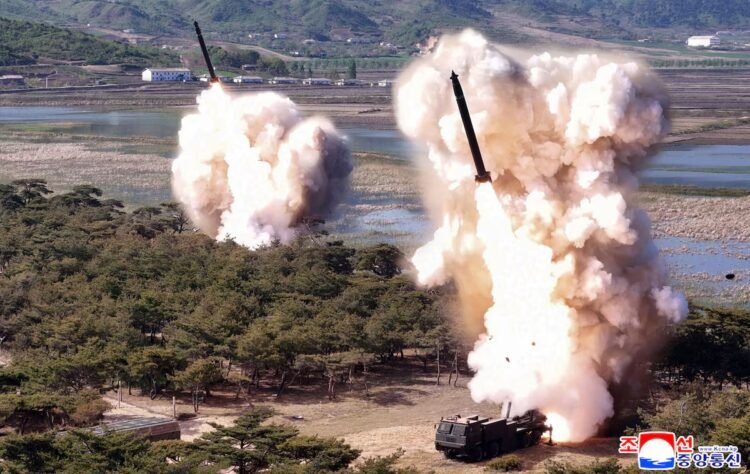SEOUL, May 9 — North Korean leader Kim Jong Un supervised the launch of short-range ballistic missile systems in drills simulating nuclear counterattacks on U.S. and South Korean forces, state media reported Friday, as Pyongyang ramps up military posturing in response to growing allied exercises in the region.
The launches, conducted Thursday from the eastern port city of Wonsan, involved multiple ballistic weapons, including systems modeled after Russia’s Iskander and 600-millimeter guided rocket launchers classified by South Korea as ballistic missiles. According to North Korea’s KCNA news agency, the drills were aimed at enhancing the rapid-response capabilities of units tasked with executing nuclear strikes.
Labeling the U.S. and its allies as “vassal states” engaged in nuclear war preparations, KCNA claimed the launches underscored the North’s ability to deliver a swift retaliatory nuclear response. Kim reportedly called for enhanced combat readiness and precision in nuclear operations, saying the role of the North’s nuclear forces must grow to deter and, if necessary, fight war.
South Korea’s Unification Ministry denounced the tests as a “clear act of provocation” and a violation of UN Security Council resolutions, warning that they pose a direct threat to regional peace.
The missile tests come amid intensified speculation over North Korea’s arms exports to Russia. South Korea’s Joint Chiefs of Staff suggested that Thursday’s launches may have doubled as performance trials for weapons destined for Russia’s ongoing war in Ukraine.
According to Seoul, the missiles traveled up to 800 kilometers during a window of launches between 8:10 and 9:20 a.m. Japan’s defense ministry confirmed none entered its exclusive economic zone and reported no damage to ships or aircraft.
The latest military activity is North Korea’s first confirmed ballistic test since March 10 and marks its sixth launch of the year. A day before the drills, Kim urged North Korean munitions factories to ramp up production of artillery shells—a move analysts interpret as part of Pyongyang’s growing military partnership with Moscow.
Further emphasizing those ties, Kim visited the Russian Embassy in Pyongyang on Friday to commemorate the 80th anniversary of the Soviet Union’s victory over Nazi Germany. He lauded the “strategic” evolution of North Korea–Russia relations, calling them crucial amid current geopolitical tensions.

 English
English



























































